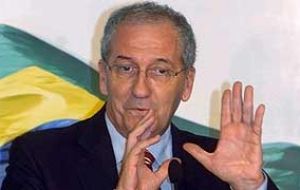MercoPress. South Atlantic News Agency
A “regulatory framework”, Lula da Silva’s farewell present for Brazilian media
 Social Communications minister Franklin Martins
Social Communications minister Franklin Martins Brazil is drafting a media bill that is geared to stimulate the participation of common citizens in the communications industry and preventing market rules from governing such a sensitive area, announced Social Communications minister Franklin Martins.
“For 200 years public opinion has been passive, was considered a simple consumer, but the new bill will stimulate citizens’ participation so it ceases to be passive”, said Martins.
Outgoing president Lula da Silva requested Martins to draft a “regulatory framework” for the media system which is to be delivered to president-elect Dilma Rousseff who takes office next January first.
“If there’s no regulation, only the market governs, which means the law of the richest and most powerful”, said Franklin Martins.
The Lula da Silva administration proposal includes an article on contents which impedes the apologia of racism and racial or sexual discrimination, as well as stimulating ‘national culture’ and ‘respect for the Portuguese language’.
Before sending the bill to Congress the future government will call “for a wide open debate from different sectors and will be consulting with public opinion” said Martins who recently toured several European countries to find out about legislation on public broadcasting and television networks.
However Brazil’s National Association of Newspapers and the Brazilian Association of Broadcasting and Television stations claim the government is promoting an ‘authoritarian model’ which pretends to control information.
“Certain sectors are seeing ghosts, they don’t want media regulation because they have little minds”, said Martins during an international seminar on electronic media with the attendance of EU, UN and Latinamerican experts.
“The world is changing, Brazil is changing and in all democratic countries there are media regulations”, said Martins.
“United States, France, England, Italy, Spain all have media regulations and nobody calls them non democratic”, he added.
President Lula da Silva in spite of his unprecedented popularity has repeatedly clashed with the media, particularly regarding claims of corruption and mismanagement of government funds involving members of his Workers party or allies in the ruling coalition.
Some of Lula da Silva’s top and closest aides, as well as members of Congress have been forced to resign exposed by the Brazilian media.




Top Comments
Disclaimer & comment rulesCommenting for this story is now closed.
If you have a Facebook account, become a fan and comment on our Facebook Page!